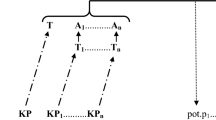Abstract
The aim of this paper is to articulate, discuss in detail and criticise Reichenbach’s sophisticated and complex argument for scientific realism. Reichenbach’s argument has two parts. The first part aims to show how there can be reasonable belief in unobservable entities, though the truth of claims about them is not given directly in experience. The second part aims to extent the argument of the first part to the case of realism about the external world, conceived of as a world of independently existing entities distinct from sensations. It is argued that the success of the first part depends on a change of perspective, where unobservable entities are viewed as projective complexes vis-à-vis their observable symptoms, or effects. It is also argued that there is an essential difference between the two parts of the argument, which Reichenbach comes (somewhat reluctantly) to accept.
Similar content being viewed by others
References
Bisbee E. (1938) A world of probability: Review of Experience and Prediction by Hans Reichenbach. Philosophy of Science 5: 360–366
Feigl H. (1950) Existential hypotheses: Realistic versus phenomenalistic interpretations. Philosophy of Science 17: 35–62
Nagel E. (1938) Review of Experience and Prediction. The Journal of Philosophy 35: 270–272
Psillos S. (2009) Knowing the structure of nature. Palgrave/MacMillan, London
Psillos, S. (2010). Choosing the realist framework. Synthese. doi:10.1007/s11229-009-9606-9
Putnam H. (2001) Hans Reichenbach: Realist and verificationist. In: Floyd J., Shieh S. (eds) Future pasts. Oxford University Press, Oxford, pp 277–288
Reichenbach H. (1938) Experience and prediction. The University of Chicago Press, Chicago
Salmon, W. (2005). Reality and rationality (P. Dowe & M. Salmon, Eds.). Oxford: Oxford University Press.
Sober E. (2002) Bayesianism-its scope and limits. Proceedings of the British Academy 113: 21–38
Author information
Authors and Affiliations
Corresponding author
Additional information
An earlier version of this paper was presented at the conference A Philosopher of Science in Istanbul: Hans Reichenbach, Bogazici University, Istanbul, May 2008. Many thanks to Gurol Irzik and Elliott Sober for the kind invitation to participate and to the participants for very useful comments.
Rights and permissions
About this article
Cite this article
Psillos, S. On Reichenbach’s argument for scientific realism. Synthese 181, 23–40 (2011). https://doi.org/10.1007/s11229-009-9594-9
Received:
Accepted:
Published:
Issue Date:
DOI: https://doi.org/10.1007/s11229-009-9594-9




